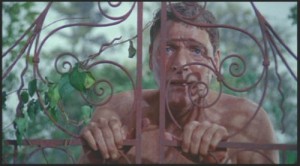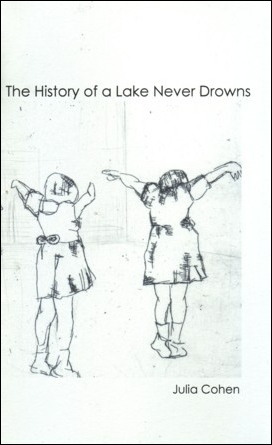Cheever, in his boxer shorts, convinces me to continue writing short stories.

From the essay “Why I Write Short Stories,” which is collected in the Library of America’s upcoming John Cheever: Collected Stories and Other Writings:
To publish a definitive collection of short stories in one’s late 60s seems to me, as an American writer, a traditional and a dignified occasion, eclipsed in no way by the fact that a great many of the stories in my current collection were written in my underwear.
Another selection from the essay:
A collection of short stories appears like a lemon in the current fiction list, which is indeed a garden of love, erotic horseplay and lewd and ancient family history; but so long as we are possessed by experience that is distinguished by its intensity and its episodic nature, we will have the short story in our literature, and without a literature we will, of course, perish.
May you be correct, Cheever. The rest of this very short essay can be found here.
Power Quote: Special T.O.C. edition, for keith n.b., with double special bonus shout-out to Paul Violi

In a comment on yesterday’s “Power Quote” post, one of our regular commenters said he couldn’t find much about M.L. Rosenthal’s The Modern Poets: A Critical Introduction on the web. Well, neither could I, actually, which is one of the reasons that my post had links to some Yeats poems he had written about instead of to anything by Rosenthal himself. So by special request, please find below the T.O.C. to the book, plus some info on Rosenthal, for the edification and enjoyment of all. Before we get to that, however, I want to give a shout-out to Paul Violi. I was lucky enough to study with Paul when I was an MFA at The New School. Of all the poets–hell, all the people–I know, he’s easily one of the best- and widest-read, and is always generous with his vast knowledge when I get a bug up my ass about this or that poetry-related topic and start suddenly shooting him emails. Most recently, that topic has been Ezra Pound. Paul pointed me to Rosenthal specifically for chapter three, “EZRA POUND: THE POET AS HERO.” After–or before–you check out the T.O.C. to this book, I emphatically recommend you click over to Paul’s website and check him out, if you don’t already know his work.
Power Quote: M.L. Rosenthal

Modern poetry as a whole tends to be tragic in its assumption that we are at a cultural dead end, in which myriad values at cross-purposes, with modern political values the most virulent of all, are choking each other to death. The major poetic situation is the struggle of a heroic sensibility, or Self, to free itself from the condition of living death imposed by this murderous predicament. Clearly, the most elementary way to gain such freedom is to insist on the priority of instinct and emotion over all logical and systematic thought and over the demands of society. In many poems, Yeats fastens on the sexual act and the mystery of sexuality as the ultimate source of meaning.
-“Yeats and the Modern Mind”
(in The Modern Poets: A Critical Introduction; (c) 1960)
Some problems just never get old, do they?
read “Leda and the Swan”
buy Poetry in English: An Anthology; M.L. Rosenthal, ed.
on Proper Usage

Steven Pinker had a piece in the NYT yesterday about John Roberts’ flub of the Oath of Office, and why, from a grammatical standpoint, it doesn’t matter. He argues that the long-standing injunction against infinitive splitting is “a myth.”
Language pedants hew to an oral tradition of shibboleths that have no basis in logic or style, that have been defied by great writers for centuries, and that have been disavowed by every thoughtful usage manual. Nonetheless, they refuse to go away, perpetuated by the Gotcha! Gang and meekly obeyed by insecure writers.
I thought it was a pretty interesting argument, and I’m always glad to see a shibboleth overturned, so I forwarded the link to my friend Amy McDaniel, who of all my friends is probably the most interested in such things, as well as the best at them. (In addition to being an expert grammarian, she’s also an expert on food, and you can/should check out her contributions to the Slashfood blog.) She replied to my message with a one-liner: “Steven Pinker is an enemy of proper usage,” to which I replied that “his insidious claims are deeply seductive.” I imagine at this point she realized I don’t know anything about Steven Pinker–or as much as I should about grammar–and so she sent me a passage of David Foster Wallace’s “Tense Present,” wherein DFW critiques Pinker’s “descriptivist” approach to usage. The essay, which originally appeared in Harper’s in 2001, can be read in its entirety here, or you can find just the part that Amy sent me to settle the matter pasted in after the jump.
The History of a Lake Never Drowns

Julia Cohen is a frequent target of admiration on this here blog, and now we’ve got her in our sights again. She has a new chapbook out from Dancing Girl Press, which, as you’ll see when you click through, for a measly $7 includes shipping, so it’s an extra good deal. If you don’t know JC’s work, you can start at her blog and then go from there, but I also cajoled her into giving me a few sample poems from the chappie, which you can find just below the fold.
Winter in Maine on Route 113 by Denis Dunn

Here's Some Snow For You
snow bent birches
bow down low
to log laden
trucksthe mountains maturely
hold onto acres of snow
like a 19th century bodice…can the child of spring
be far from birth?
Tennis Poem By Edward de Vere

This Man Did Not Write This Poem, But He Does Play Tennis
Whenas the heart at tennis plays (Love compared to a tennis-play)
Whenas the heart at tennis plays, and men to gaming fall,
Love is the court, hope is the house, and favour serves the ball.
The ball itself is true desert; the line ,which measure shows,
Is reason, whereon judgment looks how players win or lose.
The jetty is deceitful guile; the stopper, jealousy,
Which hath Sir Argus’ hundred eyes wherewith to watch and pry.
The fault, wherewith fifteen is lost, is want of wit and sense,
And he that brings the racket in is double diligence.
And lo, the racket is freewill, which makes the ball rebound;
And noble beauty is the chase, of every game the ground.
But rashness strikes the ball awry, and where is oversight?
and quote; A bandy ho,and quote; the people cry, and so the ball takes flight.
Now, in the end, good-liking proves content the game and gain.
Thus, in a tennis, knit I love, a pleasure mixed with pain.
This is my husband. I wrote this poem about our love.
Ben Greenman’s Holocaust Memoir

Dear Ms. Winfrey:
I am a great admirer of your show, and, while I do not watch every day, when I do watch I am always touched in or near my heart. Recently, I was watching “Best Life Week,” in which your guests discussed the challenges that they have overcome, and it occurred to me that the events of my early life, which are the subject of an upcoming book I have just completed, might be perfect for a future episode. I do not expect you to read the entire book, but I wanted to take a moment to review some of the highlights—though “highlights” is a crass, commercial word for such a wrenching memoir.
I was born in Chicago in 1969. Shortly afterward, in 1941, my entire family was rounded up by the authorities and sent to the Theresienstadt camp, along with tens of thousands of other Jews, who hailed principally from Czechoslovakia, Austria, and Germany. [Keep reading]
“Slush” by Joshua Cohen
Not sure if anybody’s noticed, but I’m a bit of a creature of habit. I like getting turned onto new stuff, sure, but once I’ve found something I like I tend to stick by it like a truly neurotic compulsive or perhaps like a faithful hound. So it shouldn’t surprise anyone that I was very happy to learn that Joshua Cohen, whose multi-part Nextbook essay about Kafka’s office writing I covered here, has a new piece of short fiction up at The Fanzine, which is a very cool site and probably not as widely known as it ought to be. So do yourself two favors: first, check out Cohen’s story, “Slush,” and second, start checking on Fanzine more often than you’ve been. (if you want to do yourself a third favor, pink up a copy of The Weaklings, Dennis Cooper’s most recent collection of poems, which Fanzine published in a special illustrated limited edition of unlimited awesomeness.) Here’s the beginning of “Slush.”
Dear Aaron Priestly,
Thank you for letting us take a read on your manuscript. STORY OF MY LIFE was bold, and compelling, but ultimately I was not convinced that I was the right person to represent it. I just did not find this a must read. It did not click, I regret to inform. Nor did it hold ME. I find your premise lacking, quite. Good luck elsewhere (*I can no longer accept queries from writers who have not been previously published or who have not been referred to me by a colleague*).
Please accept my very best wishes for the success of STORY OF YOUR LIFE. Though I did not fall in love with your story enough to continue reading it, I pass. We must pass. Obviously not for me, obviously. He, she, it, passes.
FOUND/LOST/SALVAGED: The Recently Deflowered Girl, by Edward Gorey

My friend Alice Townes, layout editor at R2: The Rice Review, forwarded me this non-Rice-related link the other day to a post in the found_objects livejournal community. A guy named bo_bailey wrote: “I found this book on my friend’s 84-year-old landlord’s bookshelf. Published in 1965 with illustrations by Edward Gorey, I present to you The Recently Deflowered Girl.”
He posted scans of the whole book on Jan. 7th. Alice turned me onto it a couple days later. I fwded to my friend Amanda and planned to post on the book today. But then last night, while I was in Coney Island eating food from the Mongolian-Russian border region and watching snow fall on the beach, Amanda was writing me back that the link I sent her didn’t work. So I tried opening it myself, and sure enough–the post seems to be gone. (If it revives in the same spot, it was here.)
Luckily, I still had the now-gone page open in my browser, so I saved all the jpegs, and was going to just post the thing myself, but then I decided to Google it first, and it turns out that some quicker-on-the-trigger fellow had already had that bright idea. So, now with gratitude to Alice or the original tip, and to Joey Devilla for saving me a bit of work, I present to you: The Recently Deflowered Girl, by Edward Gorey.


